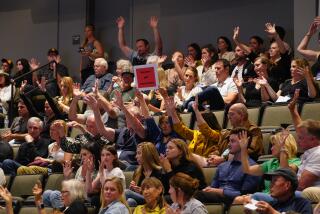Moorpark Trustees Consider Dropping Student Activity Fees : Education: Panel will study a new proposal to require groups and teams to make up the lost money through fund raising.
- Share via
Fearing that current practices are discriminatory and illegal, the Moorpark school board next week will consider dropping stiff fees imposed on students who participate in extracurricular activities.
Years ago, in response to shrinking resources, the district began charging students who participate in after-school--and, in some cases, in-school--activities through a series of fees payable to booster clubs or directly to the district.
High school cheerleaders, for example, pay roughly $800 per year, while members of the school’s flag team are charged $600, officials said. Members of the school’s marching band pay at least $250, not including instrument rentals or purchases.
The fees cover such things as uniforms, transportation, summer camps and other expenses.
Under a new policy the board will consider Tuesday, no student would be directly charged for taking part in any activity, and the individual groups and teams would have to make up the lost financial support through more intensive fund raising and possibly through district assistance.
The need for the change is outlined in a five-page memo sent to board members recently by the district’s attorney, Richard Currier. The current fee policy violates the “free school” guarantee in state law, Currier said.
An inquiry from board member Pam Castro prompted Currier’s review. Castro said that financial difficulties experienced by a member of the high school’s flag team led to questions over the legality of the district policy.
Board member Clint Harper said he would support the proposed change even if it were not mandated by law.
“My kids can be in anything they want, within reason,” he said. “But I know there are parents out there who are in a position where they can’t do that and it bothers me. That seems, to me, to grate against the entire concept of public education.”
But some Moorpark booster club and high school officials question whether the proposed shift in board policy might end up shrinking the slate of after-school offerings, making student participation even more difficult.
“For us, if the school doesn’t kick in the money that we get from the fees, it’ll eventually stop our program from doing anything other than playing in school,” said Bill Bingham, president of the Moorpark High School Band Boosters.
Pat Jellander, assistant high school principal, said most groups are still trying to figure out how they would be affected by the new policy.
“It’s so vague and so broad that no one is sure at this point what effect it’s going to have on our comprehensive program,” said Jellander, who added that the new restrictions could bring about “possibly the end of some of our groups.”
Castro said she felt that the district could end student fees and maintain its current slate of programs without spending any district money. She said she was hopeful that a bolstered fund-raising effort by the individual groups and continued financial contributions of more affluent parents could make up the shortfall.
“The bottom line is that there are parents who are willing to work extremely hard in the school district and who are very generous,” Castro said. “I still see them putting forth the kind of money that they were willing to put forth . . . All we’re erasing is that subtle form of monetary financial discrimination that does occur.”
Castro conceded that some minimal district financing might be required and that some of the programs may have to be scaled back, based on what the booster clubs can afford.
“Maybe things will have to be less elaborate,” she said. “The bottom line is that they’re going to have to look and see what their capabilities are.”
Other board members were less hopeful that the changes could occur without the district spending substantially on extracurriculars--or forcing dramatic changes in the way the programs operate.
*
“God, I hope she’s right,” Harper said of Castro’s vision of parental generosity. “I’ve already had parents come up to me and say, ‘Can I get a refund?’ ”
Board member Tom Baldwin agreed.
“I expect changes,” he said. “I don’t think everything will go on as before with just a little more fund raising. I think it’s going to make a difference in the way we do things and in the size of the programs.”
Bingham said that roughly $10,000 of the band’s $15,000 budget comes from student fees, despite an aggressive yearlong fund-raising effort.
“I don’t see it,” he said of Castro’s prediction that increased fund raising could preserve his program. “Not in our particular town, because there’s so much competition for the money that’s out there to begin with. There’s fund-raisers going on every week.”
More to Read
Sign up for Essential California
The most important California stories and recommendations in your inbox every morning.
You may occasionally receive promotional content from the Los Angeles Times.










